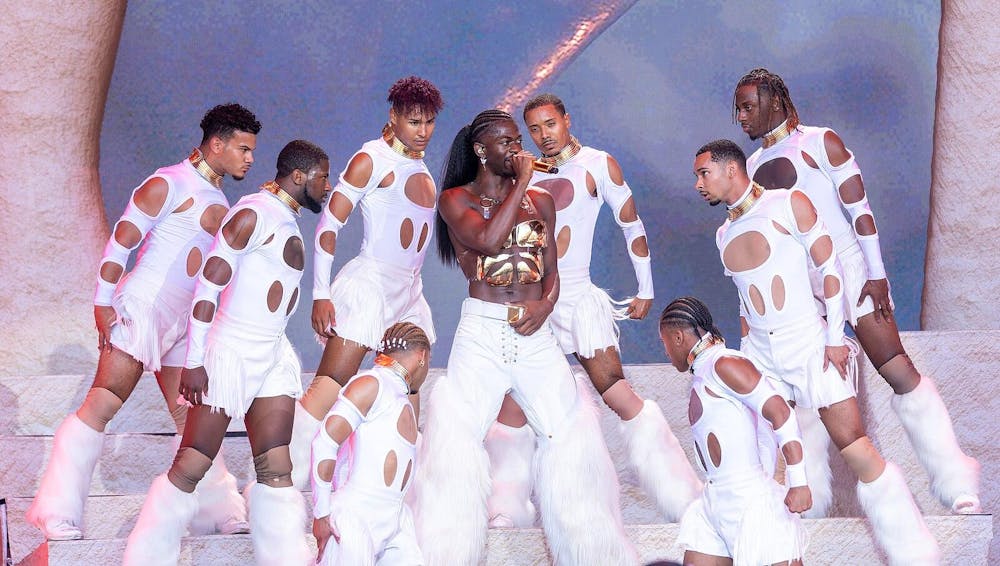Lea en español
On March 26, rapper and internet sensation Lil Nas X released his long awaited new single “MONTERO (Call Me By Your Name),” alongside a music video, co-directed by himself and Ukrainian music video director Tanu Muino.
The song itself, which aptly references both the 2017 film of the same name and Lil Nas X’s real first name, chronicles his emotional and sexual experiences in a past relationship. While he is openly gay himself, he laments over the frustration of dating a partner who is closeted, with lines like “you live in the dark, boy / I cannot pretend.” This lyrical expression of the anxiety that surrounds being forced — by societal homophobia — to live a life plagued with secrecy is also expressed in the song’s provocative and campy music video. The video uses a biblical setting to address the ways that Christianity has historically been weaponized against the LGBTQ+ community.
MONTERO’s video begins with a monologue from Lil Nas, proclaiming that “in life, we hide the parts of ourselves we don’t want the world to see [...] but here we don’t.” This sets the stage for the themes of liberation from homophobia that the video goes on to explore. It then goes on to show an angelic Nas playing guitar in a picturesque Garden of Eden setting, until this utopia is interrupted by the sexual temptations of a snake man who is also played by Nas. This recreation of Eve’s “original sin” alludes to the demonization of femininity and homosexuality in traditional Christian rhetoric, furthering the narrative’s exploration of queer oppression. It also, in a rather literal way, promotes self-love.
The rest of the video’s story shows Nas being berated by a heavenly court as a martyr, pole dancing into the depths of Hell and giving the devil a lap-dance. All of these abstractly biblical scenes serve the song’s general message of embracing one’s sexuality despite being told not to by the powers that be. He embraces the hatred that the idea of “all gays going to Hell” has imposed on his community in the most explicit way possible — by going to Hell and making the most of it.
Since its release, the video has gained massive success, with over 50 million YouTube views and over two million likes. The video’s inclusion of Satan — and the release of a companion satan-themed shoe — has also garnered criticism from Christian pastors and conservative pundits, who are outraged by this perceived glamorization of the devil. A tweet from Republican South Dakota Gov. Kristi Noem, for instance, implied that Nas’ video and shoes were a threat to the very “soul of our nation” and told her followers that they need to fight back against it. It even now appears that Nike themselves are siding with these concerns in a way, as they have taken up a lawsuit against the rapper over the re-designed Nike “Satan shoes.”
Lil Nas X has taken the influx of such dramatic “concerns” over his art in stride though, by responding to such backlash with humorous messages and memes, which have given him greater leverage over the situation and gained him even more support amongst fans. His response to Governor Noem where he tells her to “do [her] job” instead of worrying about his shoes, for example, received 10 times as many likes as her original tweet. The fact that Lil Nas X is able to retaliate against these accusations of “satanism” and “depravity” by pointing out how absurd they are shows that he has a keen understanding of what moralizing rhetoric about the “devil” has historically been about — exclusion and control.
This type of music-inspired fear-mongering is not a new phenomenon in the U.S., and it has had a seasoned history in the music industry. In the early 1980s, widespread conspiracy theories surrounding the prevalence of “satanic rituals'' led many religious figures to point fingers at the “corrupting” effects of pop culture, particularly rock music, on the nation's youth. Televangelists and other leaders of the religious right across the country warned viewers about the “dangers'' of rock music’s profanity and even claimed that it was deeply connected to the occult. Many accused artists, such as the Black rock star Prince, were even criticized for their lack of gender conformity. These paternalistic accusations truly only served to exclude certain types of artistic expression, but they also led to real ends. In 1985, a congressional hearing about musical profanity led to the creation of the “Parental Advisory” warning that is seen on albums today. This move towards moralization and censorship sent shockwaves through American culture, and its long term effects can even be seen in controversies around the profanity of rap music as this genre has surged in popularity in recent decades. It is fitting then, that Lil Nas X — a gay Black rapper — has found a way to embrace this legacy of opposing the imposition of conservative “norms” to tell his own story. He has explicitly blended this long-present fear of “Satan” in music with another fear of the religious right — gay sexuality.
The MONTERO video’s placement of explicit sexual and satanic imagery into these historical and biblical scenes is something with artistic intention — he is revealing a part of the queer experience, and more specifically the Black queer experience, by examining how traumatic and exclusive religious spaces can be for those who do not fit a particular, prescribed mold. On March 27th he tweeted — “i spent my entire teenage years hating myself because of the s—t y'all preached would happen to me because i was gay. so i hope u are mad, stay mad, feel the same anger you teach us to have towards ourselves.” His lap dance on Satan is not a literal declaration of his satanic worship, but a complex and purposefully shocking display of his movement past moralistic control of his sexuality and art. Decrying that Lil Nas X is somehow literally promoting satanic worship through his video thus provides an absurd way to distract from what such critics are likely actually upset about — how unapologetic he is about being himself.
It seems that, in response to the Christian conservative figures who continue to call the MONTERO video shocking and deviant, Lil Nas X can simply point out a simple fact — that was kind of the point.







